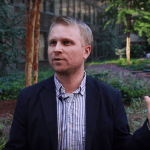With a background in the applied health sciences and as a theologian in bioethics and the medical humanities, Dr. Ashley John Moyse approaches the topic of his lecture, the art of living for the technological age, from the perspective of our incarnated human being. For Moyse, it is vital that we approach our being as more than dead flesh waiting to be animated, but as soul spoken in bodily form.
Moyse begins his lecture with an assertion of the crisis of technology, but his view of technology is expansive—the crisis is much more than a crisis of our tools. Following George Grant, Moyse argues that “technology is our ontology,” and that this “techno-ontology” constitutes a “compendium of industrial, political, and moral machinery.” Certainly technology has greatly benefited human beings, and its successes are impossible to deny, and difficult to criticize. But as a “schema or strata of ordinal practices, parts, or procedures,” technology has a way of enframing our activity in the world (a Heideggerian notion upon which Moyse draws) so that the ends of our activity are determined for us without question, ends that extend far beyond the realm of mere machinery. From industry to politics to morality, technology conditions our lives.
For Moyse, this condition requires understanding followed by a readiness for protest, a critical engagement with that power that threatens the personality, particularity, and difference of human being. We are more than dead flesh waiting to be challenged forth by our machines. Moyse calls us to a personal solidarity, a position that eschews staid principles in favour of a commitment to persons, to creative, moral agents. Only from such a position is protest possible.
Moyse is a Post-Doctoral Fellow in Theology and Science at Regent College. The entirety of his insightful and provocative lecture can be viewed below:












